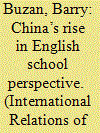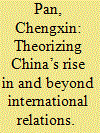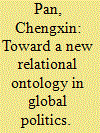|
|
|
Sort Order |
|
|
|
Items / Page
|
|
|
|
|
|
|
| Srl | Item |
| 1 |
ID:
161575


|
|
|
|
|
| Summary/Abstract |
This chapter looks at English School (ES) theory as a way of understanding China and its rise. It focuses both on where ES theory fits well enough with China to provide an interesting perspective, and on where ‘Chinese characteristics’ put China outside the standard ES framing and raise theoretical challenges to it. The first section briefly reviews the ES literature on China. The second section places China within the normative structure of contemporary global international society by looking at how China relates to the primary institutions that define that society. The third section explores two challenges that ‘Chinese characteristics’ pose for how the ES thinks about international society: hierarchy and ‘face’. The Conclusions assess the strengths and weaknesses of ES theory in relation to understanding the rise of China.
|
|
|
|
|
|
|
|
|
|
|
|
|
|
|
|
| 2 |
ID:
161573


|
|
|
|
|
| Summary/Abstract |
The phenomenon of China’s rise has urged some to look for International Relations (IR) theories with ‘Chinese characteristics’. A number of these have been associated with the ‘relational turn’. Yet, attempts to bring the Anglophone and the Sinophone strands of the relational turn have failed to transcend the bifurcating metanarrative of the mainstream. To rectify this trend, the analysis engages the literatures on guanxi, the relational turn, and Chinese IR and develops a normative claim about the underlying relationality of knowledge production in post-Western IR. The contention is: (i) that the criticism of substantialism offered by the Anglophone literature on the relational turn fails to overcome its Eurocentrism; (ii) that by subscribing to the epistemic duality of the West vs. the non-West, the Sinophone literature has aborted the political promise of the concept of guanxi. The study deploys guanxi to amplify the intrinsic relationality both of global life and the realms of IR.
|
|
|
|
|
|
|
|
|
|
|
|
|
|
|
|
| 3 |
ID:
161570


|
|
|
|
|
| Summary/Abstract |
Westphalian international relations (IR) entrenches us in dichotomized deadlocks like ‘China’ versus the ‘West’. To break out, we need to emancipate IR spiritually, not just analytically, politically, or even ethically. By this, I mean an open mind and heart when encountering difference through others. Epistemic compassion epitomizes this process. Two pre-Westphalian traditions provide a means and an example: advaita monism and daoist trialectics.
|
|
|
|
|
|
|
|
|
|
|
|
|
|
|
|
| 4 |
ID:
161572


|
|
|
|
|
| Summary/Abstract |
Chinese government representatives and scholars have attempted to ameliorate fears about China’s rise by portraying China as a new and friendlier kind of great power. It is claimed that this represents a new way of relating which transcends problematic Western understandings of Self–Other relations and their tendency to slip into domination and enmity. This article takes such claims as a point of departure, and analyses them with focus on the explicit discussions of friendship in international relations theory. Paying attention to current Chinese thinking which emphasizes guanxi relationships, friendship can contribute to the development of genuinely relational international relations thinking and move beyond a focus on ossified forms of friendship and enmity centred on the anxious self. The vantage point of friendship suggests a way out of the dangers of theorizing Self in contrast to Other, and reopens the possibility to conceptualize Self with Other.
|
|
|
|
|
|
|
|
|
|
|
|
|
|
|
|
| 5 |
ID:
161574


|
|
|
|
|
| Summary/Abstract |
The post-Western agenda of international relations will not be complete until it has tracked the worlding strategy of the provincialized West. This article examines one important aspect of this strategy, namely the appropriation of non-Western theory by the West as exemplified by the reception of Sun Zi’s The Art of War (or Sunzi Bingfa) in the Anglosphere. It looks at the ways in which Sunzi Bingfa has been translated, interpreted and applied in the field of Strategic Studies. This article identifies three plausible ways in which theory ‘travels’ from the East to the West, namely: (i) a useless resource or outmoded form of thinking, (ii) a useful, if exotic, culturally bound source, and (iii) a body of wisdom with universal value. It contends that most readers in the Anglosphere tend to cross these different routes to varying degrees. This critical examination of the reception of Sunzi Bingfa enables us to see that the academic field of Strategic Studies is rooted in self-other dynamics on the one hand, and characterized by an extreme parochialism on the other. The conclusion makes a normative judgment that the West can better contribute to global IR by conceiving of and relying on non-Western knowledge as an access to universal truth.
|
|
|
|
|
|
|
|
|
|
|
|
|
|
|
|
| 6 |
ID:
161569


|
|
|
|
|
| Summary/Abstract |
China's rise, like the demise of the Soviet Union, is one of the defining events in the contemporary world. Yet, while the unexpected Soviet collapse and the end of the Cold War sparked the ‘Third Debate’ in International Relations (IR) theory, it is puzzling that the rise of China has yet to generate a comparable process of shell-shock and soul-searching among IR theorists. Just as the end of the Cold War is more than simply the end of a bipolar power struggle per se, so too China's rise is much more than the familiar ascendancy of another great power. Rather, it is also a complex, evolving and possibly border-traversing and paradigm-shattering phenomenon in global life that, on the one hand, requires fresh and innovative theorizing in and beyond IR and, on the other hand, potentially offers new insights for us to rethink world politics more broadly. This article introduces this Special Issue that seeks to tentatively respond to this theoretical, epistemological and ontological challenge. It draws attention to the blind spot in IR theorizing on China, and calls for deeper engagement between IR theory and China's rise that goes beyond mere ‘theory-testing’ within the existing perimeters of mainstream IR.
|
|
|
|
|
|
|
|
|
|
|
|
|
|
|
|
| 7 |
ID:
161571


|
|
|
|
|
| Summary/Abstract |
The theoretical challenges for international relations (IR) posed by China’s rise cannot be adequately addressed at a mere theoretical level. Predicated on a Cartesian/Newtonian ontology that assumes a mechanistic world made up of discrete, self-contained parts (e.g., sovereign nation-states), mainstream IR theories offer limited understanding of China’s rise. In this article, I propose an alternative, holographic relational ontology. Drawing upon recent IR scholarship on relational ontology and holographic ideas in quantum physics as well as traditional Asian thoughts, this ‘new’ ontology posits that the world exists fundamentally as holographic relations, in which a part is a microcosmic reflection of its larger whole(s). As a part of various wholes in global politics, ‘China’ is thus never an entity in and of itself, but holographic reflections of them. Its rise is best understood as a phenomenon of holographic transition, in which characteristics of those larger wholes are being enfolded into what is known as ‘China’. Thus, both the ‘China’ challenges and ‘China’ opportunities, rather than some inherently ‘Chinese’ properties, are products of China’s holographic relations. This ontology has broader conceptual and methodological as well as policy implications for IR in East Asia and beyond.
|
|
|
|
|
|
|
|
|
|
|
|
|
|
|
|
|
|
|
|
|